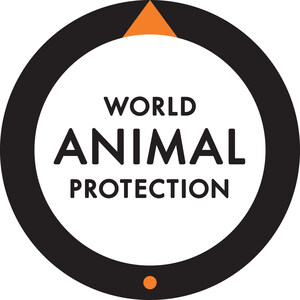NEW YORK, May 12, 2020 /PRNewswire/ -- Wildlife trade has become big business and the subsequent exploitation of wild animals puts our health, economies and biodiversity at risk, says World Animal Protection as it launches a global campaign today, targeting G20 leaders to support a permanent wildlife trade ban to protect animals and prevent future zoonotic pandemics.
Wild animals don't belong to us. They belong in the wild.
As the world struggles to contain the spread of COVID-19, there is a need for a coordinated global approach. Each of World Animal Protection's 14 offices around the world will be petitioning their representative members in the G20, a global forum of the world's 20 largest economies, to take steps towards implementing a global wildlife ban. It's widely believed that COVID-19 transferred to humans from wild animals and that 70% of all future diseases in people will come from wild animals. A global ban on wildlife trade is, therefore, a critical measure for reducing the chances of future pandemics.
During the 2008 financial crisis, the G20 showed its potential as a worldwide leadership body, agreeing to global solutions to stabilize the world's economies. It's time once again for the G20 to make a collective commitment and end the inter-country trade in wild animals and wild animal products. The G20 will convene in Riyadh, Saudi Arabia in November 2020.
COVID-19 is one of the worst pandemics of animal origin that we have faced in a century. World Animal Protection believes it won't be the last, unless we urgently ban all commercial trade of wild animals globally.
Businesses are placing profit, estimated between US $7-23 billion a year, over the health and welfare of both people and animals. The multi-billion-dollar wildlife trade takes animals from their natural environments or commercially farms them for food, traditional medicine, entertainment, fashion, or to be sold into the exotic pet industry, exposing them to stress and creating a hotbed for disease. As we have seen with COVID-19, these diseases can then be transferred to humans.
World Animal Protection has been a leading voice advocating for a ban to all wildlife trade for more than 20 years. Now more than ever, the organization calls on the G20 nations to ban:
Traditional Medicine
The demand for traditional medicine has devastating consequences for many species of wildlife traded globally, including bears who are poached and farmed for their bile, which we investigated in our recent report, Cruel Cures.
Traditional medicine has an estimated value of $60 billion a year1, and is thought to account for nearly 30%1 of China's pharmaceutical revenue.
Wild Animals in Entertainment
The animals caught up in the cruel wild animal entertainment industry have often been legally traded or captive bred and spend many hours a day in close proximity to humans, increasing the potential spread of zoonoses.
Prices of elephants used for rides have sky-rocketed to over $50,0002, and a single dolphin can generate anything between $400,000 and $2 million per year3 for entertainment venues such as SeaWorld.
Steve McIvor, CEO at World Animal Protection says:
"Cruel multi-billion-dollar businesses have been exploiting wild animals on an industrial global scale and we are now all seeing the true cost of that. This pandemic isn't just about wild animals being sold for food. It's much bigger than that, it's about greed and the commodification of wild animals at every level.
"If we learn anything from this situation, it is that we need to leave wild animals where they belong, in the wild. We all have a responsibility to make a shift in our behavior and attitudes towards animals that could save the lives of millions of people, animals and our economies.
"If we don't purchase exotic pets or traditional medicine that contains wild animal products, and don't visit venues with performing animals, we will send a clear message that wildlife cruelty is no longer tolerable – for the animals, our health and the planet.
"Some measures are being taken at national level, but there is a need for a coordinated global action. We urgently need to persuade the G20 to take steps towards implementing a global wildlife ban to protect us from future pandemics."
World Animal Protection has a strong track record of supporting local communities to transition away from incomes based on wildlife cruelty. It's urgent that we come together now to implement to a comprehensive wildlife trade ban to eliminate the threats of future pandemics to our health and economies.
Join us and call for world leaders to end the global trade of wild animals.
1 https://www.nationalgeographic.com/animals/reference/traditional-chinese-medicine/
2 World Animal Protection: Taken for a Ride – 2017 report
3 World Animal Protection: Behind the Smile report
Notes to editors:
- Check out the Animal Protection Index – an interactive tool that ranks 50 countries worldwide on how well their legislation protects animals. Find out more here.
- For more information on World Animal Protection, visit our website.
SOURCE World Animal Protection

Related Links
WANT YOUR COMPANY'S NEWS FEATURED ON PRNEWSWIRE.COM?
Newsrooms &
Influencers
Digital Media
Outlets
Journalists
Opted In





Share this article